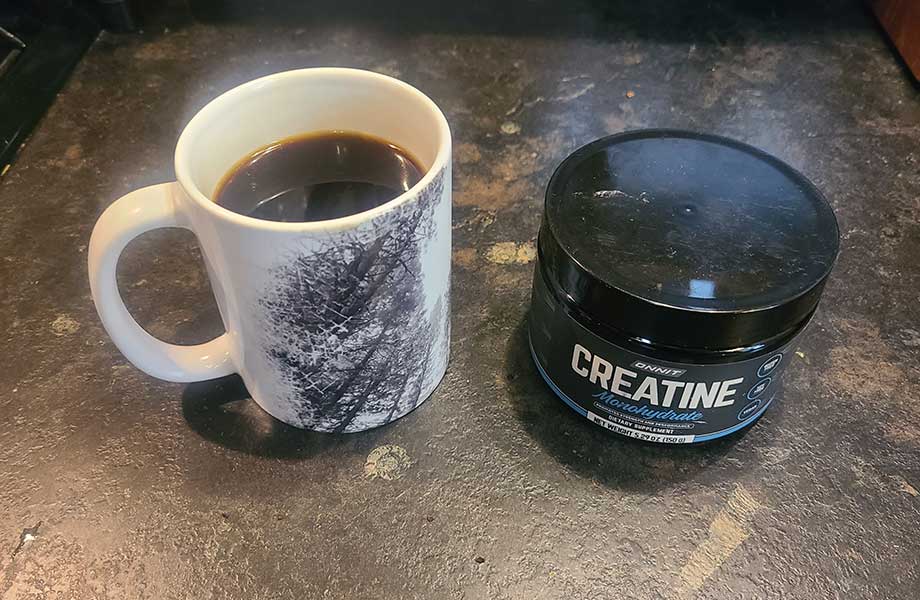We test and review fitness products based on an independent, multi-point methodology. If you use our links to purchase something, we may earn a commission. Read our disclosures.
If you’re looking for ways to optimize your supplement game, you may have looked into combining creatine and coffee. Creatine and caffeine are both effective for helping you work out harder, but you may not be sure if there are any risks of combining the two.
That’s what we’re here for—at Garage Gym Reviews, we aim to provide the most informative, science-backed recommendations on sports nutrition supplementation so that you can use them to safely meet your fitness goals.
Keep reading to learn more about how creatine and caffeine compare to each other, their benefits for exercise performance, potential side effects, and whether or not taking creatine and coffee together is a good idea.
RELATED: How To Take Creatine
Medical disclaimer: This article is intended for educational and informational purposes only. It is not intended as a substitute for medical advice. For health advice, contact a licensed healthcare provider.
Creatine vs Caffeine
Creatine and caffeine are both ergogenic aids, meaning they both help improve exercise performance in some way. They can also help you put more effort in during workouts. However, they work very differently and provide different benefits. We’ll discuss each in more detail below.
What Is Creatine?
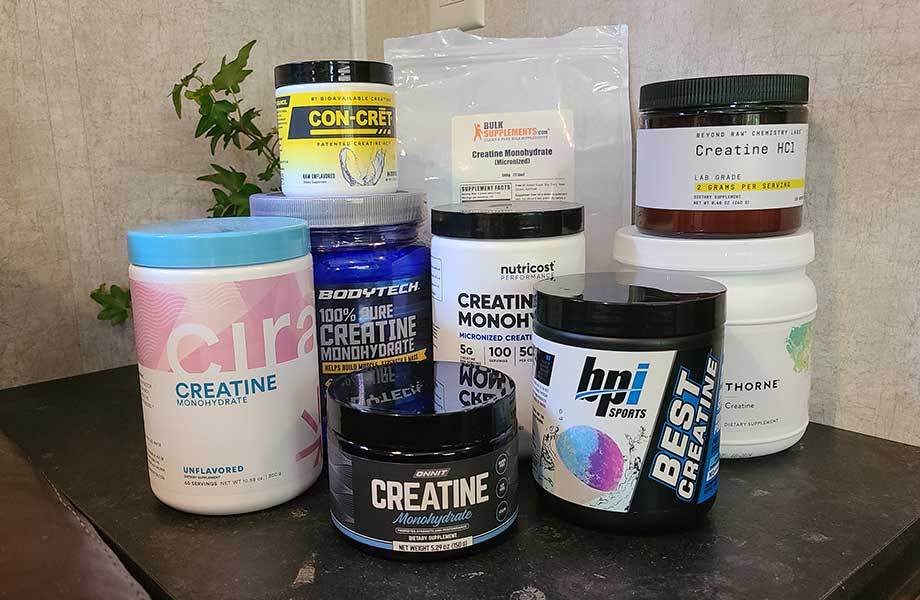
Creatine is a natural organic acid produced by the body using the amino acids arginine, glycine, and methionine. It’s stored primarily in muscle tissue in the form of creatine phosphate.
Creatine is also obtained through the diet from animal-based sources like red meat, poultry, seafood, eggs, and dairy. Vegetarians and vegans who don’t take creatine supplements tend to have lower muscle creatine stores.
The benefits of creatine supplementation come from its ability to pack the muscles with more creatine than they would naturally contain without supplementation.
What Is Caffeine?
Caffeine is a central nervous system stimulant naturally present in coffee beans, tea leaves, and cacao. It’s used to reduce fatigue and boost energy by blocking a compound called adenosine from attaching to cellular receptors in the brain. Adenosine is a central nervous system inhibitor, inducing feelings of calmness and making you feel sleepy.
Effects On Exercise Performance
In the muscle, creatine is stored as creatine phosphate (also known as phosphocreatine). Creatine phosphate is used by the body to replenish adenosine triphosphate (ATP), a molecule broken down for energy during high-intensity, high-effort physical activity like strength training and sprinting.
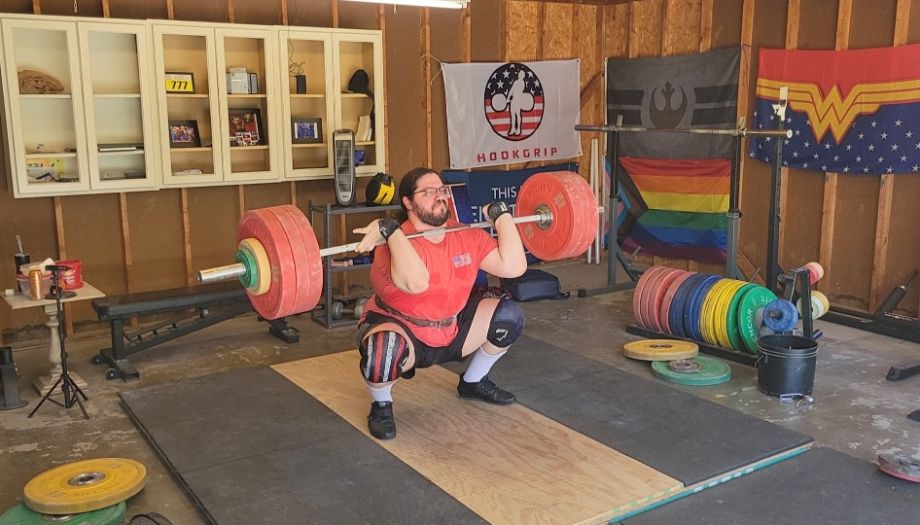
These types of exercise are called anaerobic exercises, based on the fact that they primarily rely on ATP for energy. On the other end of the spectrum are endurance or “aerobic” activities that rely on the breakdown of dietary carbohydrates and muscle glycogen for their main fuel.
Having more creatine available in the muscles during resistance workouts can help you put in more reps over time, which can translate to faster muscle growth and improved body composition.
As an ergogenic aid, caffeine1 works very differently. It’s thought to stimulate the sympathetic nervous system, increasing heart rate and breathing ability and slowing blood flow to the digestive organs. It also helps muscles contract more forcefully.
Creatine monohydrate has been shown2 to be most effective for improving your ability to perform anaerobic exercises and to build muscle mass over time, while caffeine tends to be more effective for endurance activities like running and cycling. Its impact on strength and sprinting outcomes are mixed.
RELATED: Does Creatine Have Caffeine?
Is It Safe to Mix Creatine and Coffee?
Mixing creatine in your coffee seems like a genius idea to get the benefits of both supplements while also saving time and getting some fluids in. But is it a good idea?
Research Says
Good news: Creatine and caffeine are both widely considered to be safe compounds and can be consumed together, as long as they’re taken within recommended guidelines.
Creatine, for example, is safe to take in doses of up to 30 grams per day for five years, according to the International Society of Sports Nutrition1. This is higher than the common dosing guidelines of 20 to 25 grams of creatine each day during creatine loading, so normal creatine supplementation shouldn’t pose any safety risks for most people.
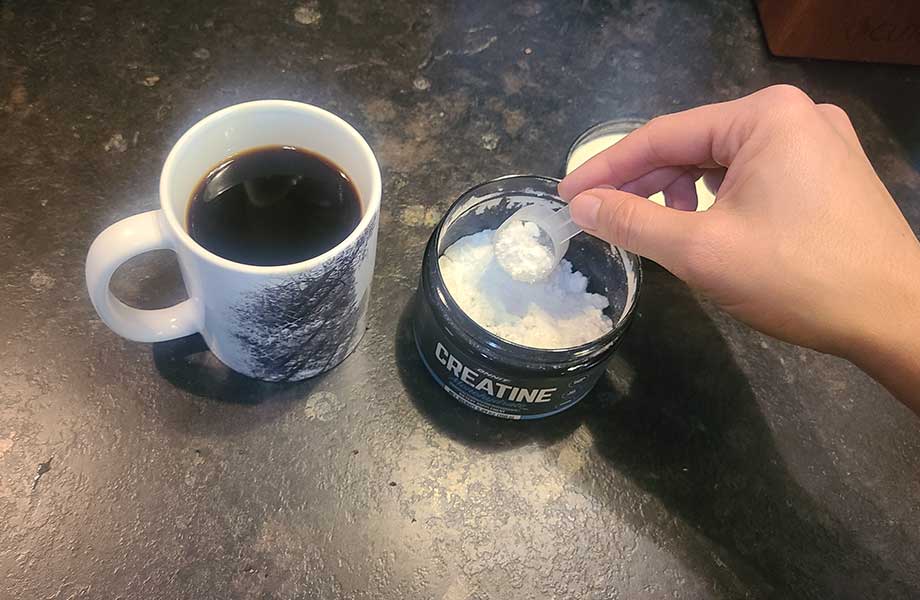
The FDA2 states that caffeine consumption is safe for most people when limited to no more than 400 milligrams per day. This is the equivalent of about three to five cups of coffee, depending on how strong you make it.
In larger doses or for caffeine sensitive people, negative effects of caffeine can include an elevated heart rate, high blood pressure, nervousness, jitteriness, inability to concentrate, and trouble sleeping.
Creatine and caffeine have different effects in the body. For example, caffeine is a stimulant, while creatine is not. This means there are no dangerous additive effects of these compounds when taken together.
This is supported by the fact that at least in the short-term (about eight weeks), multi-ingredient pre-workout supplements are shown to be safe3 in most studies. These supplements often contain both caffeine and creatine.
RELATED: Can You Mix Creatine With Protein Powder?
Pros and Cons of Creatine and Coffee
As with most things, there are benefits and risks to consider when deciding whether to mix creatine with coffee.
Pros
- Can help improve exercise performance when taken after a creatine loading phase compared to creatine alone
- Provides fluids required for proper digestion of creatine
- Can simplify your pre-workout supplementation regimen
- Creatine dissolves well in hot liquids
- If drinking sweetened coffee, the extra carbs can help replenish muscle glycogen
You may have heard that caffeine counteracts creatine, but this isn’t always true. According to a 2023 systematic review published in Critical Reviews in Food Science and Nutrition4, taking creatine and caffeine together can provide benefits for athletic performance as long as it’s taken during a creatine maintenance phase.
The study authors recommended that people avoid taking caffeine during the creatine loading phase, however, since this timing didn’t provide any benefits.
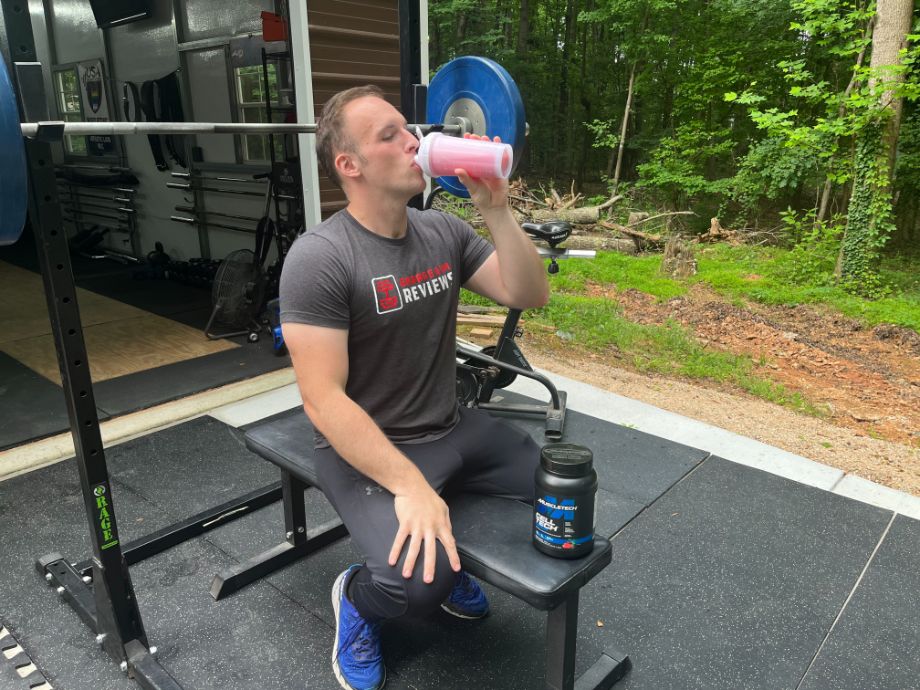
Cons
- Caffeine content of coffee may reduce creatine-related performance benefits during a creatine loading phase
- May alter the flavor of your coffee
- Drinking coffee with a high-fat creamer (half-and-half, canned coconut milk, etc.) before a workout may slow the absorption of caffeine and creatine
- Coffee can have a diuretic effect if you don’t drink it regularly, but this is usually mild and shouldn’t impact your hydration status
There’s a lot of talk in gym circles about creatine causing stomach discomfort and dehydration5, but these myths have been debunked. If you already tolerate coffee well, digestive discomfort caused by stirring creatine into your coffee is unlikely.
RELATED: Creatine Side Effects
Creatine and Coffee: Final Thoughts
Overall, mixing creatine and coffee is safe as long as you stick to recommended dosing guidelines for each. It can also help you reap the performance-enhancing effects of both creatine and caffeine.
Recent research suggests that taking caffeine and creatine at the same time may not be effective for improving physical performance during a creatine loading phase, but is helpful during creatine maintenance after a loading phase has been completed.
It’s unclear how helpful caffeine is when taken before a resistance training workout, so starting to drink coffee to get extra benefits alongside your creatine may not provide you with much benefit in these types of exercises.
However, If you already drink coffee and are simply looking for a more convenient way to take creatine, go for it!
Creatine and Coffee: FAQs
Can I drink coffee while taking creatine?
Yes, it’s safe to drink coffee while taking creatine since creatine is not a stimulant. It’s best not to consume more than 400 milligrams of caffeine per day, according to the FDA, and to stick to recommended creatine doses.
Can creatine go in hot drinks?
Yes, powdered creatine can go in hot drinks and mixes very well. Hot temperatures do not negatively impact the structure of creatine, especially at normal drinking temperatures.
What should you not mix creatine with?
Avoid mixing creatine with pre-workout supplements that already contain creatine. You should talk to your doctor before taking creatine if you take NSAIDs or diuretics/water pills, as creatine may interfere with these medications.
What is better: creatine or caffeine?
Creatine and caffeine are both effective for improving exercise performance. Creatine is most effective for improving performance during short, high-intensity exercises, such as lifting a few more reps or sprinting slightly faster during a workout, and increasing muscle mass over time.
Caffeine may help with these exercises, as well, but is thought to be more effective for endurance exercises like running or cycling.
Is it OK to take creatine on an empty stomach?
Creatine should be OK to take on an empty stomach since claims that creatine causes side effects like stomach cramps and nausea aren’t supported by scientific evidence. If you do experience stomach upset, you can try taking creatine with food to see if it helps.
These statements have not been evaluated by the Food and Drug Administration. This product is not intended to diagnose, treat, cure, or prevent any diseases.
References
- Evans, J., Richards, J. R., & Battisti, A. S. (n.d.). Caffeine – statpearls – NCBI bookshelf. https://www.ncbi.nlm.nih.gov/books/NBK519490/
- Zuniga, Jorge M.; Housh, Terry J.; Camic, Clayton L.; Hendrix, C. Russell; Mielke, Michelle; Johnson, Glen O.; Housh, Dona J.; Schmidt, Richard J.. The Effects of Creatine Monohydrate Loading on Anaerobic Performance and One-Repetition Maximum Strength. Journal of Strength and Conditioning Research 26(6):p 1651-1656, June 2012. | DOI: 10.1519/JSC.0b013e318234eba1
- Kreider RB, Kalman DS, Antonio J, et al. International Society of Sports Nutrition position stand: safety and efficacy of creatine supplementation in exercise, sport, and medicine. J Int Soc Sports Nutr. 2017;14:18. Published 2017 Jun 13. doi:10.1186/s12970-017-0173-z
- Food and Drug Administration. Spilling the Beans: How Much Caffeine is Too Much? FDA website. Accessed 9/14/23.
- Harty PS, Zabriskie HA, Erickson JL, Molling PE, Kerksick CM, Jagim AR. Multi-ingredient pre-workout supplements, safety implications, and performance outcomes: a brief review. J Int Soc Sports Nutr. 2018;15(1):41. Published 2018 Aug 8. doi:10.1186/s12970-018-0247-6
- Marinho AH, Gonçalves JS, Araújo PK, Lima-Silva AE, Ataide-Silva T, de Araujo GG. Effects of creatine and caffeine ingestion in combination on exercise performance: A systematic review. Crit Rev Food Sci Nutr. 2023;63(20):4785-4798. doi:10.1080/10408398.2021.2007470
- Antonio J, Candow DG, Forbes SC, et al. Common questions and misconceptions about creatine supplementation: what does the scientific evidence really show?. J Int Soc Sports Nutr. 2021;18(1):13. Published 2021 Feb 8. doi:10.1186/s12970-021-00412-w
Further reading

In this Aviron Victory Treadmill review, we’ll see if this treadmill, packed with gamified workouts and interactive programming, is worth its price tag. Read more

Learn from a certified personal trainer why you should incorporate tempo training into your strength work. Read more

A premium price tag that matches its premium quality. See if this Olympic lifting barbell fits your budget in this Eleiko IWF Weightlifting Training Bar review. Read more

If you’re looking for ways to optimize your supplement game, you may have looked into combining creatine and coffee. Creatine and caffeine are both effective for helping you work out harder, but you may not be sure if there are any risks of combining the two. That’s what we’re here for—at Garage Gym Reviews, we aim to provide the most informative, science-backed recommendations on sports nutrition supplementation so that you can use them to safely meet your fitness goals. » Read more about: Can You Mix Creatine and Coffee? » Read more

